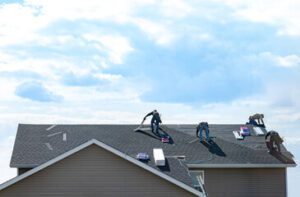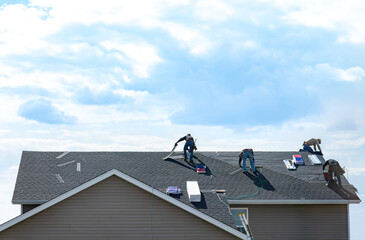When Roofing Company Lebanon TN it is important to find one that you can trust. There are several factors to consider, including: tenure and local ownership, roofing materials and warranties, and local online reviews.
Even though Ike doesn’t get up on roofs anymore, he still knows that this is a trade that requires evolution and change. Having the right tools for the job makes all the difference.
Working as a roofing contractor can be an exciting and rewarding career choice, offering good earning potential, flexibility, and independence. However, it is also a physically demanding job that requires a lot of strength and stamina. It involves climbing ladders, carrying heavy materials, and exposing workers to harsh weather conditions. It can lead to aches, pains, and more serious injuries if not handled properly.
When hiring a roofing company, it is important to consider their experience in the industry. Look for a portfolio that demonstrates their versatility and quality work. Also, ask them about the types of projects they’ve undertaken in the past. A roof is a large investment, so it’s important to choose a contractor with extensive knowledge of the various roofing systems.
Inquire about the roofing company’s safety protocols and adherence to industry regulations. A reliable contractor will prioritize the safety of their employees and your property. They will have the right safety equipment and know how to handle potential hazards on-site. In addition, they will be familiar with local building codes and regulations, preventing any legal complications.
Request a detailed estimate that includes all costs associated with the project, including material and labor. This will prevent misunderstandings and ensure that the work will be completed on time. Also, make sure the contractor provides warranties on both materials and workmanship. This will protect you from future damage and repairs. The length and scope of the warranty should be discussed in advance to determine if it’s sufficient. If the contractor doesn’t offer a warranty, it may be best to look elsewhere. This can be a red flag that they’re inexperienced or are not committed to quality work.
License
A roofing company with a valid license is a sign of professionalism. Whether you need a new roof or repairs, hiring a licensed contractor will ensure that your project is completed correctly and safely. A licensed roofing contractor will also be bonded and insured, ensuring that you are covered in case of any accidents or issues with the work.
Before selecting a contractor, check their licensing status with your local government’s website. Most states and cities have online portals where you can enter a contractor’s name or license number to instantly verify their license status. This will typically give you information on their licensing history, including disciplinary actions and expiration dates.
While gaining hands-on experience is essential for developing the necessary skills for becoming a successful roofer, you should also consider taking classes to prepare for your licensing exam. Roofing schools, such as Roofing Academy X, offer 2- to 3-day courses that can help you pass your licensing exam and start your roofing business.
The class of license a roofer holds determines the type of roofing work they are qualified to perform. For example, a class C license entitles contractors to construct, remodel, or repair single-family and duplex residences as well as structures attached to those homes. It also allows them to perform framing, swimming pool construction, and non-structural remodeling. However, it does not authorize them to perform HVAC, plumbing, or electrical services.
Another important consideration is to choose a contractor with an established reputation in the community. A reputable contractor will have a proven track record of satisfied customers and will be willing to provide references from past clients. In addition, they will be able to provide proof of insurance and bonding.
The most important thing is to hire a licensed contractor with the experience and expertise you need for your roofing project. Madden Brothers Roofing is a reputable and licensed roofing contractor that offers reliable roofing services in Pittsburgh, PA. We can assist you with all of your roofing needs, from determining the best materials to installing and repairing them. We can even provide a free consultation and estimate to get you started on your next project!
Insurance
Roofing is a dangerous job, and accidents can happen. Having the right insurance coverage is a sign that a roofing contractor takes their business seriously and wants to protect their clients. Insurance can also help clients feel comfortable knowing that if something goes wrong, the company has the resources to handle it.
General liability insurance provides protection against lawsuits that may arise from damage caused by a roofing project. For example, if a worker falls off a ladder and is injured, this policy can cover medical expenses and legal fees. This type of coverage is essential for any contractor, and it is typically required by many clients.
Inland marine insurance is another important coverage for roofers. It protects tools and equipment in transit or at a job site from theft or damage. This is especially important for roofing contractors, who often use expensive tools. Additionally, builder’s risk insurance protects construction projects from fire, theft, and other hazards.
Workers’ compensation insurance is a legal requirement for any business with employees. This coverage pays for medical costs and lost wages if a worker is injured on the job. The cost of this policy can vary widely based on factors such as payroll size and claims history.
Commercial auto insurance covers any vehicles used for business purposes. This includes work trucks, vans, and any vehicles that are used to transport materials or tools to a job site. The cost of this insurance varies, but is generally higher than personal auto insurance.
Roofing contractors should consider purchasing contractors pollution liability insurance. This type of insurance can cover damages resulting from the release of contaminants, chemicals, hazardous waste, or other pollutants into the air, land, surface water, or groundwater. The roofing industry uses a variety of chemicals, sealants, adhesives, coatings, and solvents that can cause pollution. These products also produce fumes that can be harmful to humans if inhaled. This type of insurance is typically more affordable for small businesses with few claims. It is also available at discounted rates for those with multiple policies.


